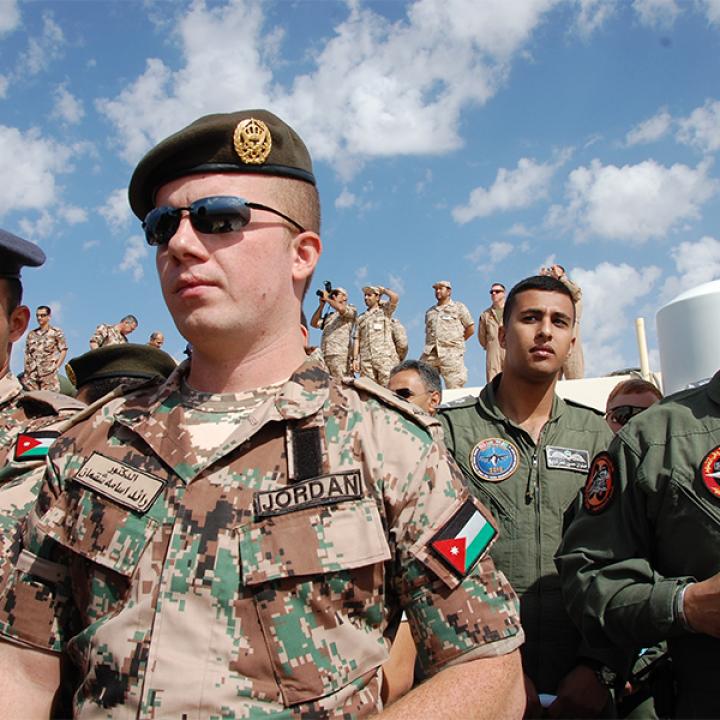

Embarrassing counterterrorism lapses and corruption revelations over the past year demonstrate that the kingdom's security cannot be taken for granted.
The pro-Western Hashemite Kingdom of Jordan serves as the principal base of operations for the U.S.-led military campaign to roll back the Islamic State in Syria. Increasingly, however, Jordan is itself being targeted by the organization. In recent months, the Kingdom has suffered a sharp uptick in IS terrorist activity. Worryingly, in the face of this challenge, Jordanian intelligence and security forces -- long considered the gold standard of the Arab world -- have underperformed, raising questions of competence.
Twice in June, for example, Jordanian security installations were compromised, with deadly consequences. On June 6, a lone attacker entered a Jordanian Intelligence Directorate (GID) facility 20 minutes north of Amman, shooting and killing five officers before escaping. Two weeks later, IS detonated a car bomb at a Jordanian military base on the Syrian border, killing six soldiers. On both occasions, Jordanian officers were reportedly asleep on guard duty.
Just a few months earlier, in March, Jordan's gendarmes and an elite commando unit from the Kingdom's vaunted 71st Counterterrorism Battalion raided an IS cell in the northern town of Irbid. While the soldiers succeeded in killing eight IS terrorists, the military operation took more than 12 hours, and was said to have been severely hampered by breakdowns in communication between the security services. One foreign observer in the Kingdom described the assault as "a shit show."
Adding insult to injury, in April, 87,000 5.56 NATO-standard bullets belonging to the British Army disappeared from a depot during joint desert exercises with the Americans. British forces had been stationed at a Jordanian military base near the port of Aqaba when the ammunition was hauled off by truck. To date, the disposition of the stolen bullets remains unknown, but the concern is that the slugs will ultimately reach IS weapons.
Perhaps more disturbing than these security lapses, however, has been the slow trickle of information confirming what appears to be endemic corruption among the ranks of the Jordanian mukhabarat, the Kingdom's widely respected intelligence services. Problems in this important foreign and domestic security apparatus have been well publicized: Two former chiefs of the organization were convicted and one is currently serving a lengthy jail sentence for corruption.
In June, a New York Times report confirmed longstanding rumors that the GID hocked thousands of AK-47 assault rifles worth millions of dollars, provided by the CIA to arm moderate Syrian rebels. Funds generated from the sales were reportedly used to purchase "expensive SUVs, IPhones, and other luxury items." While some arrests were made, it remains unclear how far up in the organization the corruption extends.
The syphoning of the weapons came to light after a self-radicalized Jordanian policeman used one of these AK-47s, purchased on the black market, to kill two Americans and two South African instructors, as well as two of his fellow countrymen, at a police training facility in the Kingdom this past November.
While alarming, these incidents do not suggest a fundamental problem between Washington and its best Arab ally. Indeed, Amman remains a critical partner in the war against IS, providing basing and logistical support for U.S. and coalition forces, and actively participating in air operations over Syria. Jordan also remains committed to its 1994 peace treaty with Israel, and is a critical advocate for political and religious moderation in the region. Recognizing the import of the Kingdom to U.S. interests in the Middle East, this year Washington will provide more than $1.6 billion to Jordan, including nearly $800 million in military and counterterrorism assistance, equivalent to roughly 10 percent of Jordan's annual budget.
Notwithstanding this substantial U.S. aid, Jordan faces enormous challenges. In addition to the security threat, the Kingdom currently hosts over a million Syrian refugees, and has an unemployment rate of 15 percent, with youth joblessness approaching 40 percent. And to date, some 2,500 Jordanian nationals have joined the jihad in Syria, including three sons of sitting members of Parliament. It's difficult to imagine that these bleak economic prospects -- and the continued slaughter of Sunni Muslims in Syria -- won't contribute to radicalization among Jordan's traditionally moderate population.
Amid this adversity, Jordan has until now proven remarkably resilient. Security is good, and the GID, military, and border security services continue to demonstrate commitment, frequently absorbing casualties while engaging IS. Even so, recent developments suggest the Kingdom is ill prepared to deal with a complex mass terrorist attack a la Paris or Mumbai.
It has long been axiomatic that Jordan's security apparatus is the best in the Arab world. While this dictum likely remains true, events of the past year demonstrate that security in Jordan cannot be taken for granted. Based on the current trajectory, it is all but certain that Jordan will be contending with intensified IS terrorist activity in the coming months and perhaps years.
In an increasingly chaotic region, U.S. interests depend greatly on the stability and prosperity of the Hashemite Kingdom. Washington must continue to work closely with Amman to improve the capabilities of the Kingdom's security apparatus. At the end of the day, however, unlike Iraq, the security of the realm will depend solely on whether Jordan's security services are up to the task.
David Schenker is the Aufzien Fellow and director of the Program on Arab Politics at The Washington Institute.
American Interest

